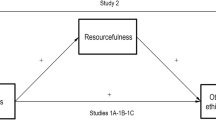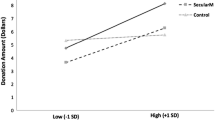Abstract
The present study examined whether the induction of a mindful state would influence ethical decision making in a trolley problem that was modified to contain variables relevant to one’s inclusive fitness. N = 312 participants – half of which were presented with a guided mindfulness meditation – were presented with a modified trolley problem in which they were given a choice: let five strangers die, or divert the trolley toward a single target who will be killed by the trolley instead of the five strangers. This single target was manipulated to be one of the following five individuals: a stranger, the participant’s friend, cousin, sibling, or romantic partner. Participants in a mindful state were more likely to divert the trolley away from the five strangers when the individual target was a stranger, friend, or cousin. However, individuals in a mindful state were no more likely than controls to divert the trolley when the single target was a sibling or romantic partner. These results indicate that mindfulness may increase utilitarian decision making when the sacrificial target is not the participant’s close kin member or romantic partner.

Similar content being viewed by others
References
Bishop, S. R., Lau, M. A., Shapiro, S., Carlson, L., Anderson, N., Carmody, J., … Devins, G. (2004). Mindfulness: A proposed operational definition. Clinical Psychology: Science and Practice, 11, 230–241.
Bleske-Rechek, A., Nelson, L. A., Baker, J. P., Remiker, M. W., & Brandt, S. J. (2010). Evolution and the trolley problem: People save five over one unless the one is young, genetically related, or a romantic partner. Journal of Social, Evolutionary, and Cultural Psychology, 4(3), 115.
Burnstein, E., Crandall, C., & Kitayama, S. (1994). Some neo-Darwinian decision rules for altruism: Weighing cues for inclusive fitness as a function of the biological importance of the decision. Journal of Personality and Social Psychology, 67(5), 773–789.
Fitzgerald, C. J., & Colarelli, S. M. (2009). Altruism and reproductive limitations. Evolutionary Psychology, 7(2), 234–252.
Fitzgerald, C. J., & Lueke, A. K. (2017). Mindfulness increases analytical thought and decreases just world beliefs. Current Research in Social Psychology, 25, 80–85.
Fitzgerald, C. J., Thompson, M. C., & Whitaker, M. B. (2010). Altruism between romantic partners: Biological offspring as a genetic bridge between altruist and recipient. Evolutionary Psychology, 8(3), 462–476.
Fitzgerald, C. J., & Whitaker, M. B. (2009). Sex differences in violent versus non-violent life-threatening altruism. Evolutionary Psychology, 7(3), 467–476.
Hamilton, W. D. (1964). The genetical evolution of social behavior. II. Journal of Theoretical Biology, 7(1), 17–52.
Kabat-Zinn, J. (2003). Mindfulness-based interventions in context: Past, present, and future. Clinical Psychology: Science and Practice, 10, 144–156.
Karelaia, N., & Reb, J. (2015). Improving decision making through mindfulness. In J. Reb & P. W. B. Atkins (Eds.), Mindfulness in Organizations: Foundations, Research, and Applications (pp. 256–284). Cambridge University Press.
Korchmaros, J. D., & Kenny, D. A. (2001). Emotional closeness as a mediator of the effect of genetic relatedness on altruism. Psychological Science, 12(3), 262–265.
Korchmaros, J. D., & Kenny, D. A. (2006). An evolutionary and close-relationship model of helping. Journal of Social and Personal Relationships, 23(1), 21–43.
Kruger, D. J. (2001). Psychological aspects of adaptations for kin directed altruistic helping behaviors. Social Behavior and Personality: An International Journal, 29(4), 323–330.
Kruger, D. J. (2003). Evolution and altruism: Combining psychological mediators with naturally selected tendencies. Evolution and Human Behavior, 24(2), 118–125.
Lueke, A., & Gibson, B. (2015). Mindfulness meditation reduces implicit age and race bias: The role of reduced automaticity of responding. Social Psychological and Personality Science, 6(3), 284–291.
Lueke, A., & Gibson, B. (2016). Brief mindfulness meditation reduces discrimination. Psychology of Consciousness: Theory, Research, and Practice, 3(1), 34–44.
Neyer, F. J., & Lang, F. R. (2003). Blood is thicker than water: Kinship orientation across adulthood. Journal of Personality and Social Psychology, 84(2), 310.
Stewart-Williams, S. (2007). Altruism among kin vs. nonkin: Effects of cost of help and reciprocal exchange. Evolution and Human Behavior, 28(3), 193–198.
Stewart-Williams, S. (2008). Human beings as evolved nepotists. Human Nature, 19(4), 414–425.
Ruedy, N. E., & Schweitzer, M. E. (2010). In the moment: The effect of mindfulness on ethical decision making. Journal of Business Ethics, 95(1), 73–87.
Salzberg, S. (2011). Mindfulness and loving-kindness. Contemporary Buddhism, 12(1), 177–182.
Shapiro, S. L., Jazaieri, H., & Goldin, P. R. (2012). Mindfulness-based stress reduction effects on moral reasoning and decision making. The Journal of Positive Psychology, 7(6), 504–515.
Thompson, J. A., & Fitzgerald, C. J. (2017). Nepotistic preferences in a computerized trolley problem. Current Research in Social Psychology, 25, 36–44.
Thomson, J. J. (1984). The Trolley Problem. Yale Law, 94, 1394–1415.
Author information
Authors and Affiliations
Contributions
All authors – Carey Fitzgerald, Jody Thompson, and Brittany Lorentz – contributed equally to the study conception, design, and execution. All authors read and approved the final manuscript.
Corresponding author
Ethics declarations
Ethics Approval
This study was performed in line with the principles of the Declaration of Helsinki. Approval was granted by the Institutional Review Board of the University of South Carolina.
Consent to Participate
Informed consent was obtained from all individual participants included in the study.
Consent for Publication
This manuscript does not display any individual participant’s responses. Data is only presented in aggregated form. Informed consent to publish aggregated data was obtained from all individual participants included in the study.
Conflict of Interest
The authors declare no competing interests.
Additional information
Publisher's Note
Springer Nature remains neutral with regard to jurisdictional claims in published maps and institutional affiliations.
Supplementary Information
Below is the link to the electronic supplementary material.
Rights and permissions
Springer Nature or its licensor holds exclusive rights to this article under a publishing agreement with the author(s) or other rightsholder(s); author self-archiving of the accepted manuscript version of this article is solely governed by the terms of such publishing agreement and applicable law.
About this article
Cite this article
Fitzgerald, C.J., Thompson, J.A. & Lorentz, B. State Mindfulness Increases Utilitarian Decision Making but Not at the Expense of Inclusive Fitness. Evolutionary Psychological Science 8, 424–429 (2022). https://doi.org/10.1007/s40806-022-00328-x
Received:
Revised:
Accepted:
Published:
Issue Date:
DOI: https://doi.org/10.1007/s40806-022-00328-x




